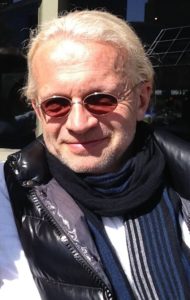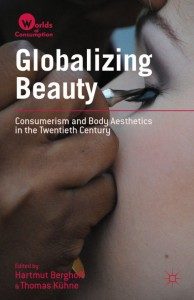
Beauty matters. It defines identity and causes controversy. A volume of essays about how beauty has done so over the course of the twentieth century—all across the world—has recently been released by Thomas Kuehne, Clark University professor of history and Strassler Family Chair in the Study of Holocaust History, and Hartmut Berghoff, director of the German Historical Institute (GHI) in Washington, D.C.
“Globalizing Beauty: Consumerism and Body Aesthetics in the Twentieth Century” (Palgrave Macmillen 2013), examines beauty’s role in modern consumer societies by bringing together the work of scholars in history, black studies, women’s studies, German studies, sociology, and anthropology. The collection of essays cover cosmetics, plastic surgery, queer beauty, star endorsements and beauty pageants; the volume includes examples from North America, the Near East, and Europe, Asia, and Africa.
“The study of beauty as a historical, sociological, and anthropological phenomenon is still in its relative infancy,” said Kuehne, who received a fellowship from the John Simon Guggenheim Memorial Foundation to fund part of his work.
“Throughout the world, more and more people from all walks of life spend time and money to make themselves beautiful because beauty expresses identity and shapes status and success,” wrote Kuehne. “Whether white or black, male or female, young or old, gay or straight, working- or middle-class, Western or non-Western, democratic or fascist, people everywhere have adopted a central maxim of the twentieth century: everyone can be beautiful, and everyone should become beautiful.
 Dagmar Herzog, distinguished professor of the Graduate Center at the University of New York City, says of the book, “Ranging from Jewish pageant queens and the Nazi cosmetics industry through Kikuyu headshavings in Kenya, lipstick in Sumatra, and muscle-men in the postwar U.S. to Muslim male nose jobs in present-day Tehran, the essays scramble all our assumptions about what is traditional and what is modern.”
Dagmar Herzog, distinguished professor of the Graduate Center at the University of New York City, says of the book, “Ranging from Jewish pageant queens and the Nazi cosmetics industry through Kikuyu headshavings in Kenya, lipstick in Sumatra, and muscle-men in the postwar U.S. to Muslim male nose jobs in present-day Tehran, the essays scramble all our assumptions about what is traditional and what is modern.”
In addition to his role at GHI, Kuehne’s co-editor Hartmut Berghoff serves as professor of economic and social history at the University of Göttingen, Germany, and recently co-edited “Business in the Age of Extremes: Essays in Modern German and Austrian Economic History.”
Professor Kuehne received his academic degrees in Germany. He earned his Ph.D. from the University of Tübingen in 1994 and taught at the Universities of Konstanz, Tübingen and Weingarten thereafter. A recipient of major grants from the German Research Foundation, he completed his habilitation thesis at the University of Bielefeld in 2003. He has been at Clark’s Strassler Center for Holocaust and Genocide Studies since 2004.
Kuehne’s recent research is concerned with the relation of war, genocide, and society with long-term traditions of political culture of Central Europe, above all with the problem of locating the Holocaust and Nazi Germany in the social and cultural history of the twentieth century. He is especially interested in synthesizing new approaches to the history of mass violence. Two of his books, “Belonging and Genocide: Hitler’s Community, 1918-1945” (2010), and “Kameradschaft” (2006), deal with comradery during wartime.
Kuehne recently completed a residential fellowship at the Member Institute for Advanced Study in Princeton, N.J., and served as a fellow of the John Simon Guggenheim Memorial Foundation.


